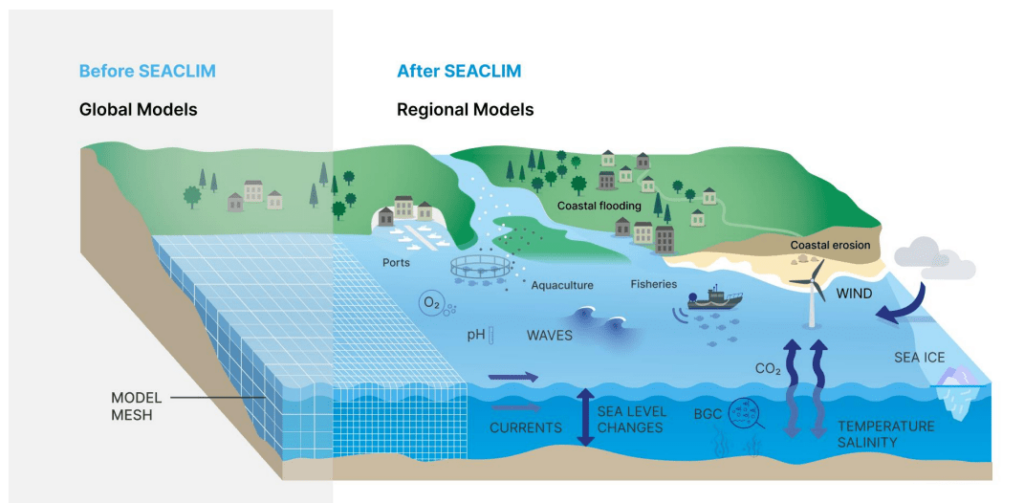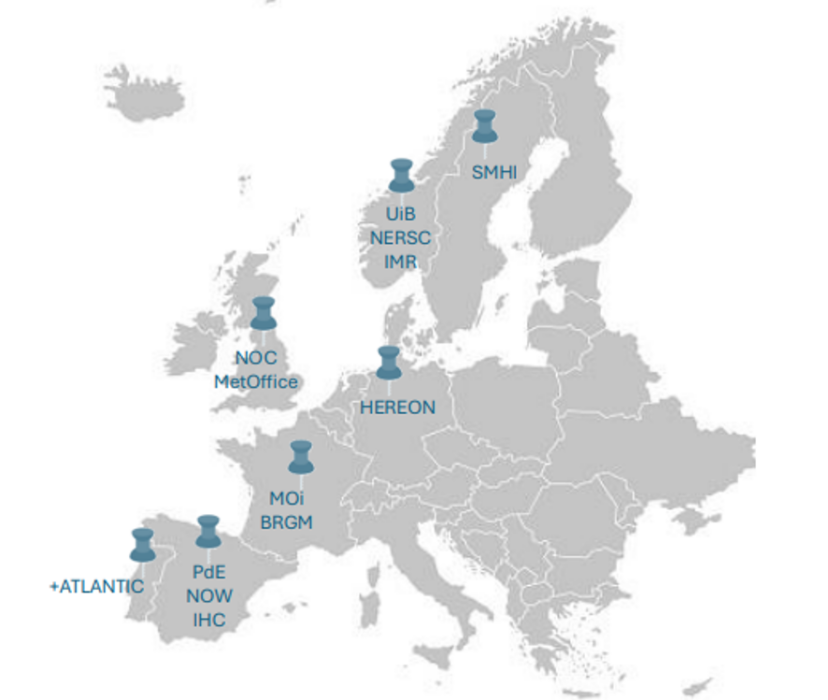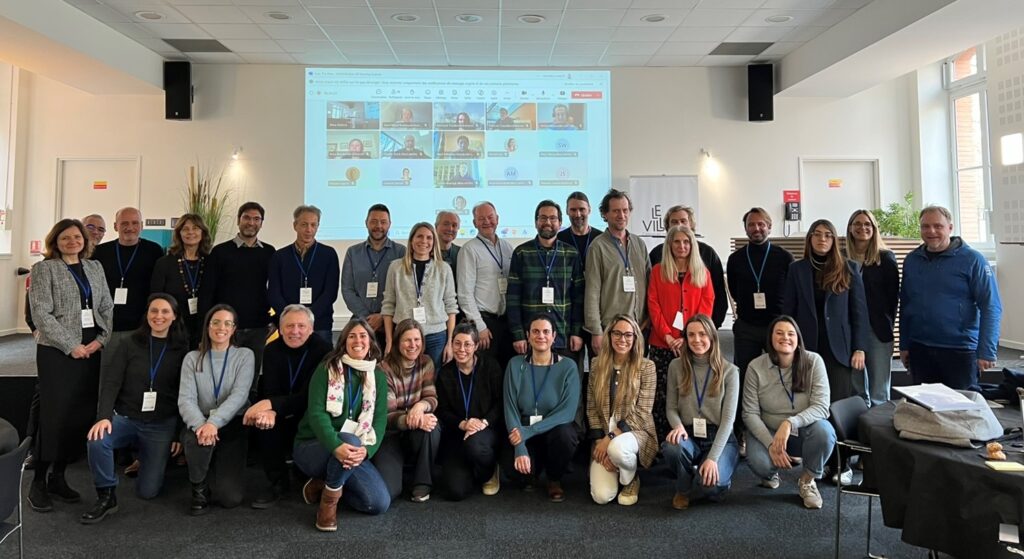
Mercator Ocean International is coordinating a new 4-year (2025-2028) European project funded by the European Union HORIZON programme, to forecast the future of our regional seas, marking a strategic expansion from its current forecasting expertise into decadal predictions and long-term climate projections. SEACLIM (European SEAs CLIMate impact prediction through regional models) aims to provide crucial insights into the changing marine environment over the coming years and decades, positioning Mercator Ocean at the forefront of marine climate research and enhancing its capacity to support critical environmental policy and decision-making.
- Thematic focus: regional projections & decadal predictions of the marine environment
- Regional focus: northeastern Atlantic, North Sea, western Mediterranean Sea, Arctic Ocean
Advancing regional climate predictions
SEACLIM will develop and refine regional ocean models to produce detailed projections of marine conditions in European seas up to the year 2100. The project focuses on the northeastern Atlantic, North Sea, western Mediterranean Sea, and Arctic Ocean.
Strategic objectives include :
- Improving understanding of physical and ecosystem processes in European seas
- Developing high-resolution regional ocean models
- Providing refined information on future decadal-to-multidecadal changes in the marine environment
- Supporting climate policy and decision-making
SEACLIM will introduce several important innovations to enhance our understanding and prediction of marine climate change and support decision-making. A cornerstone of the project is the development of regional ocean climate indicators, which will provide crucial insights into phenomena such as:
- Marine heatwaves
- Sea level extremes
- Oxygen levels
- Sea ice dynamics
- Zooplankton biomass
These indicators will offer a more nuanced and comprehensive view of the changing marine environment at regional scale. Additionally, SEACLIM will play a vital role in supporting the European Digital Twin of the Ocean (DTO) by generating “what-if” scenarios for climate change. This contribution will significantly enhance the DTO’s predictive capabilities and help in strategic planning.

Furthermore, the set of SEACLIM regionally downscaled decadal predictions and derived climate projections, as well as regional ocean climate indicators, will be leveraged to develop coastal and ocean climate services demonstrations supporting different stakeholders and decision contexts for various sectors. This approach will facilitate practical applications of the research, ensuring that the project’s scientific advancements translate into tangible benefits for society and the economy :
- Climate adaptation of ports in Spain
- Adaptation policy with respect to sea level rise in France
- Marine management (MSFD and offshore fish farm) in Norway
- Coastal risk management and the blue economy (marine renewal energies and low-trophic level aquaculture) for Germany
Mercator Ocean’s central role and strategic expansion of activities
As project coordinator, Mercator Ocean International will pioneer efforts to create climate projections for the northeastern Atlantic, North Sea, western Mediterranean Sea. These projections will encompass all aspects of the marine environment, including physics, waves, biogeochemistry, and intermediate trophic levels. Mercator Ocean will also:
- Analyse decadal predictions to identify areas of predictive skill
- Develop new regional ocean climate indicators
- Coordinate international protocols for producing and evaluating regional marine climate projections
SEACLIM represents a strategic opportunity for Mercator Ocean International to expand beyond its current short-term forecasting expertise. By moving into long-term climate projections, the organization will develop new modelling capabilities and scientific competencies across extended timescales. This project enables Mercator to transition from immediate ocean monitoring to comprehensive climate prediction, positioning the organization at the forefront of marine climate research and enhancing its capacity to support critical environmental policy and decision-making.
“ Seaclim represents a crucial step in bridging the gap between operational oceanography and climate projections,” says Dr. Angélique Melet, project coordinator at Mercator Ocean. “By developing refined regional ocean models, we aim to provide the detailed, localised data that decision-makers and coastal communities urgently need. This project will help us better understand and prepare for the impacts of climate change on our seas, from the next decade to the end of the century.“ Angélique Melet, Head of Climate & Ocean service at Mercator Ocean, and SEACLIM project coordinator.
Collaborative European effort
SEACLIM brings together 13 partners across Europe, including research institutions, meteorological offices, and environmental organizations. This collaborative approach ensures a comprehensive and multifaceted examination of our changing seas.
SEACLIM Partners:
– Brgm
– Colab +Atlantic
– Hereon
– IH Fundacion del Instituto de Hidraulica ambiental de Cantabria
– Institute of Marine research
– Mercator Ocean International
– Met office
– National Oceanography Center
– NERSC
– Now Systems
– Puertos del Estado
– SMHI
– Universitas Bergensis

Kick-off Event in Toulouse
The SEACLIM project was officially launched with a kick-off event on January 22-23, 2025, at the Village by CA in Toulouse. With 60 registered participants, this gathering marks the beginning of an important four-year journey towards better understanding and predicting the future of European seas.
Funded by the European Union. Views and opinions expressed are however those of the author(s) only and do not necessarily reflect those of the European Union or REA. Neither the European Union nor the granting authority can be held responsible for them.


